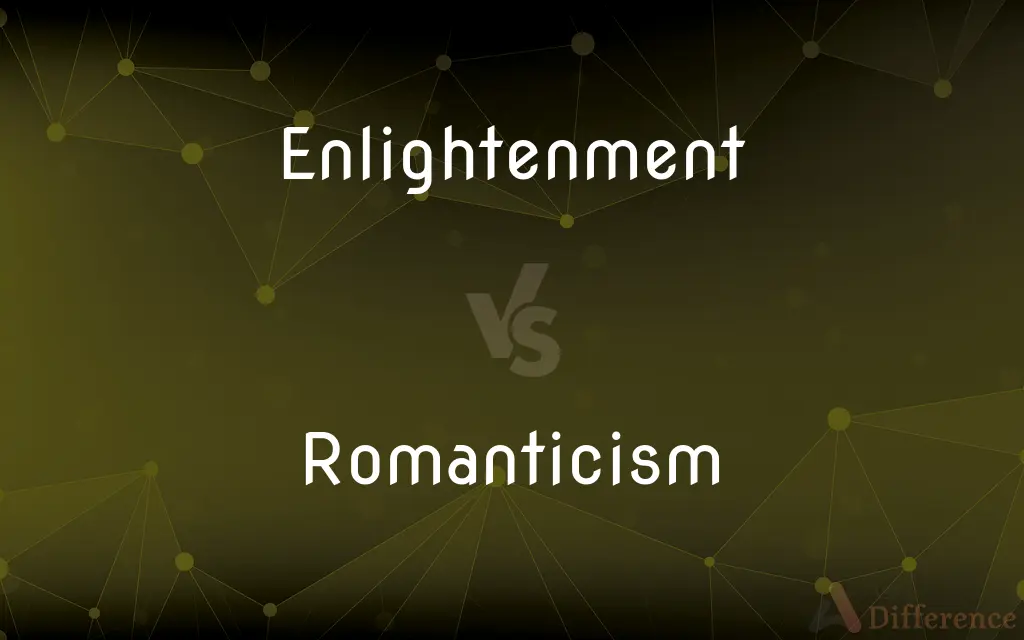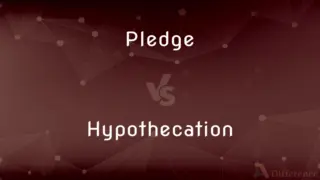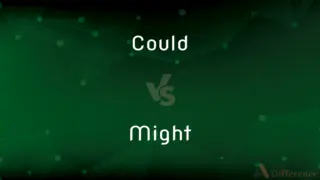Enlightenment vs. Romanticism — What's the Difference?
By Maham Liaqat & Urooj Arif — Updated on March 21, 2024
Enlightenment emphasizes reason, logic, and scientific evidence in understanding and improving society, while Romanticism celebrates emotion, nature, and individualism as central to human experience.

Difference Between Enlightenment and Romanticism
Table of Contents
ADVERTISEMENT
Key Differences
Enlightenment, emerging in the 17th and 18th centuries, strongly advocated for reason and logic as the primary means to gain knowledge and improve society. This period emphasized scientific discoveries, rational thought, and the questioning of traditional authority figures and institutions. On the other hand, Romanticism, which flourished in the late 18th and early 19th centuries, reacted against the perceived cold rationality of the Enlightenment, focusing on emotions, nature, and individual expression as key elements of human experience.
The Enlightenment was characterized by a belief in progress and optimism about human capabilities, particularly in shaping society through knowledge and ethical governance. Intellectuals like Voltaire and Diderot championed enlightenment principles, advocating for freedom, democracy, and secularism. Conversely, Romanticism placed a strong emphasis on the aesthetic experience and the importance of personal emotion and intuition over societal progress. Figures like William Wordsworth and Samuel Taylor Coleridge celebrated the sublime and the beauty of the natural world, often expressing skepticism towards industrialization and the mechanization of life.
In terms of art and literature, the Enlightenment favored clarity, order, and symmetry, reflecting the period's appreciation for classical antiquity and a belief in universal truths and values. Romanticism, however, embraced the irregular, the mysterious, and the exotic, often portraying dramatic and emotional scenes that emphasized the power and unpredictability of nature, as well as the depth of human emotion.
Philosophically, the Enlightenment was grounded in empiricism and the scientific method, believing that knowledge comes from sensory experience and logical reasoning. This led to significant advancements in science, technology, and political theory. Romanticism, in contrast, valued subjectivity and the individual's internal experience, often exploring themes of transcendence, spirituality, and the ineffable aspects of human life.
The societal ideals of the two movements also diverged significantly. The Enlightenment's vision of society was one where rationality and science guided governance and ethics, aiming for equality and justice. Romanticism, however, often critiqued industrial society and its discontents, yearning for a return to nature and simpler, more authentic ways of living, which emphasized personal freedom and creativity.
ADVERTISEMENT
Comparison Chart
Core Values
Reason, logic, and scientific inquiry
Emotion, nature, and individualism
Historical Period
17th and 18th centuries
Late 18th and early 19th centuries
Focus in Arts
Clarity, order, symmetry
Emotion, nature, individual expression
Philosophical Roots
Empiricism, rationalism
Subjectivity, intuition
View on Progress
Optimistic, belief in progress
Skeptical, focus on individual experience
Compare with Definitions
Enlightenment
Advocates rationalism and empiricism, trusting in human intellect and observation.
Enlightenment thinkers believed in using logic and evidence to understand and improve the world.
Romanticism
Emphasizes intuition, imagination, and the subjective experience.
Romantic thinkers valued personal emotion and intuition over societal norms and traditions.
Enlightenment
A cultural and intellectual movement emphasizing reason, science, and individual rights.
The Enlightenment's emphasis on scientific reasoning led to many groundbreaking discoveries.
Romanticism
Reacted against industrialization and the rationalization of nature.
Romantics often lamented the loss of connection to nature due to the rise of urban industrial societies.
Enlightenment
Favors symmetry, balance, and realism to reflect rational order and beauty.
Enlightenment-era art often depicted classical themes and ideals, celebrating human achievement.
Romanticism
An artistic and intellectual movement prioritizing emotion, nature, and individualism.
Romanticism celebrated the beauty and power of the natural world as a source of inspiration.
Enlightenment
Paved the way for modern democracies, emphasizing liberty, equality, and justice.
The Enlightenment's principles were foundational in the drafting of the United States Constitution.
Romanticism
Sometimes seen as impractical or overly idealistic in its emphasis on emotion and nature.
Critics of Romanticism argue that its idealization of nature and emotion can overlook rational solutions to societal problems.
Enlightenment
Sometimes criticized for overly rationalizing human nature and society.
Critics argue the Enlightenment neglected emotional and spiritual aspects of human life.
Romanticism
Characterized by a focus on emotion, the sublime, and the glorification of the past.
Romantic art often depicted dramatic landscapes and scenes, emphasizing emotional intensity.
Enlightenment
The act or a means of enlightening.
Romanticism
Romanticism (also known as the Romantic era) was an artistic, literary, musical, and intellectual movement that originated in Europe towards the end of the 18th century, and in most areas was at its peak in the approximate period from 1800 to 1850. Romanticism was characterized by its emphasis on emotion and individualism as well as glorification of all the past and nature, preferring the medieval rather than the classical.
Enlightenment
The state of being enlightened.
Romanticism
Often Romanticism An artistic and intellectual movement originating in Europe in the late 1700s and characterized by a heightened interest in nature, emphasis on the individual's expression of emotion and imagination, departure from the attitudes and forms of classicism, and rebellion against established social rules and conventions.
Enlightenment
Enlightenment A philosophical movement of the 1700s that emphasized the use of reason to scrutinize previously accepted doctrines and traditions and that brought about many humanitarian reforms. Used with the.
Romanticism
Romantic quality or spirit in thought, expression, or action.
Enlightenment
Buddhism & Hinduism A state in which the individual transcends desire and suffering and attains nirvana.
Romanticism
A romantic quality, spirit or action.
Enlightenment
An act of enlightening, or the state of being enlightened or instructed.
Romanticism
A fondness for romantic characteristics or peculiarities; specifically, in modern literature, an aiming at romantic effects; - applied to the productions of a school of writers who sought to revive certain medi val forms and methods in opposition to the so-called classical style.
He [Lessing] may be said to have begun the revolt from pseudo-classicism in poetry, and to have been thus unconsciously the founder of romanticism.
Enlightenment
A concept in spirituality, philosophy and psychology related to achieving clarity of perception, reason and knowledge.
Romanticism
Impractical romantic ideals and attitudes
Enlightenment
Act of enlightening, or the state of being enlightened or instructed.
Romanticism
A movement in literature and art during the late 18th and early 19th centuries that celebrated nature rather than civilization;
Romanticism valued imagination and emotion over rationality
Enlightenment
Same as AufklÄrung.
Romanticism
An exciting and mysterious quality (as of a heroic time or adventure)
Enlightenment
Education that results in understanding and the spread of knowledge
Enlightenment
(Hinduism and Buddhism) the beatitude that transcends the cycle of reincarnation; characterized by the extinction of desire and suffering and individual consciousness
Enlightenment
A movement in the 18th century that advocated the use of reason in the reappraisal of accepted ideas and social institutions
Common Curiosities
How did the Enlightenment influence government and society?
It led to the development of democratic principles, human rights, and the separation of church and state.
Can Enlightenment and Romanticism coexist in a society?
Yes, elements of both movements can coexist, influencing different aspects of culture and thought.
How do Enlightenment and Romanticism view nature?
The Enlightenment sees nature as something to be understood and controlled, while Romanticism views it as a source of beauty and inspiration.
Why did Romanticism emerge as a reaction to the Enlightenment?
Romanticism arose in response to the Enlightenment's emphasis on reason, seeking to restore the value of emotion and nature.
What distinguishes the Enlightenment from Romanticism?
The Enlightenment prioritizes reason and scientific progress, while Romanticism values emotion and nature.
What role does emotion play in Romanticism?
Emotion is paramount, considered the core of human experience and artistic expression.
Did Romanticism influence any political movements?
Yes, it influenced nationalism and movements that valued cultural heritage and the natural rights of individuals.
Can the scientific advancements of the Enlightenment be reconciled with Romanticism's love of nature?
Yes, many argue for a balanced approach that values scientific progress while respecting and appreciating the natural world.
What is the role of individualism in Romanticism?
Individualism is central, with a focus on personal emotion, creativity, and the intrinsic value of the individual.
How do Enlightenment ideals impact us today?
They continue to influence modern scientific thought, liberal democracy, and educational philosophies.
How did Romanticism affect literature?
It led to a focus on personal expression, the supernatural, and a revival of interest in medieval and Gothic themes.
How did art reflect the differences between Enlightenment and Romanticism?
Enlightenment art focused on classical ideals and realism, while Romantic art emphasized emotion and the sublime in nature.
Were there any notable figures who bridged Enlightenment and Romanticism?
Figures like Goethe and Blake explored themes of both movements, blending reason with emotion and individualism.
Share Your Discovery

Previous Comparison
Pledge vs. Hypothecation
Next Comparison
Could vs. MightAuthor Spotlight
Written by
Maham LiaqatCo-written by
Urooj ArifUrooj is a skilled content writer at Ask Difference, known for her exceptional ability to simplify complex topics into engaging and informative content. With a passion for research and a flair for clear, concise writing, she consistently delivers articles that resonate with our diverse audience.














































